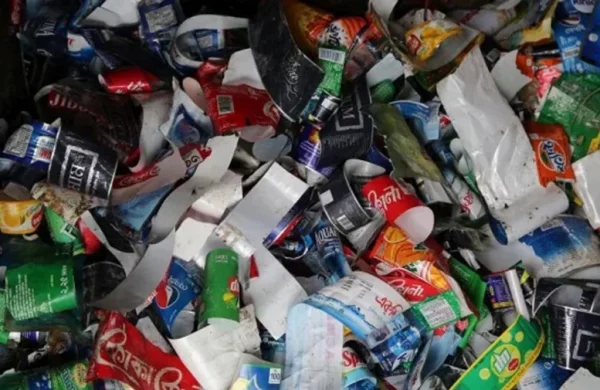Tackling single-use plastics: Challenges and the way forward
- Update Time : Friday, October 4, 2024

Why single-use plastics have no place in
a sustainable Bangladesh
–Zahid Dewan Shamim–
Plastic pollution remains a critical environmental challenge in Bangladesh, and the government’s recent actions to combat it are commendable. While the previous government undertook multiple initiatives like banning the use of plastic bags, not all such initiatives resulted in impactful changes when it comes to implementation.
One such initiative by the Ministry of Environment, Forest, and Climate Change was issuing a directive to phase out targeted single-use plastic empowered by the Solid Waste Management Rules 2021. While commendable, it is important for us to critically analyze the practicality of this directive. Since this list was published without prior stakeholder consultation, there is a high expectation that the interim government, led by prominent environmentalists in key positions, will take a more implementable and strategic approach to phasing out targeted single-use plastic in consultation with relevant stakeholders.
Given a significant number of businesses and livelihoods are directly or indirectly tied to products that have been identified in the directive, it is important to keep a few crucial aspects in mind while devising a strategy to roll it out.
UNDERSTANDING THE SCOPE OF SINGLE USE PLASTIC
The current list of 17 single-use plastic (SUP) items does not fully align with the definition of SUP provided in Rule-9 of the Solid Waste Management Rules 2021. According to the rule, SUPs are defined as any plastic packaging or product that cannot be recycled or reused. However, some items on the list are indeed recyclable or reusable. For instance, plastic bottles and caps can be both reusable and recyclable, though their handling varies. Many plastic bottles are designed for single use but can be reused if made from durable plastics.
PRODUCT-SPECIFIC PRIORITIZATION FOR PHASE OUT
Some items in the SUP list involve significant economic value, and a swift phase-out could adversely impact revenue generation. Therefore, it is crucial to engage with producers and other stakeholders to ensure practical and effective progress in addressing SUP issues. A structured, priority-based approach is essential for the directive’s success. The government should first eliminate items that have accessible replacements, before turning to more complex products that will demand innovative solutions and systemic changes.
EXPLORING ALTERNATIVES AND ENSURING FEASIBILITY
Identifying and evaluating alternatives to single-use plastics is essential. Biodegradable options are available for items like plastic cutlery and straws, but alternatives for more complex products, such as plastic sachets and food packaging, remain costly and less developed.
The government should support the development and adoption of eco-friendly materials through incentives like grants and subsidies, as well as providing technical assistance. A comprehensive approach is needed, including supportive regulations and alignment of policies with industry needs.
Private-public collaboration is crucial for this transition, combining government funding with private investment and expertise to drive research, create market incentives, and facilitate pilot testing. This synergy accelerates the development of scalable, sustainable solutions.
SPECIAL CONSIDERATIONS FOR HARD-TO-REPLACE PRODUCTS
Addressing single-use plastic packaging, styrofoam containers, and plastic sachets requires a strategic approach due to their widespread use and limited alternatives. Promoting innovation in reusable or biodegradable packaging through pilot projects could offer viable solutions. Until that happens, the food service industry’s heavy reliance on single-use plastics cannot be ignored.
Another important aspect is that SUP packaging, vital in the Fast-Moving Consumer Goods sector for its durability and low cost, poses challenges for rapid phase-out for its prospective economic impact. As many businesses and workers rely on them, transitioning away from these materials could affect jobs and incomes. It requires economic impact assessments and targeted support for affected communities.
Comprehensive strategies, including retraining programs and financial assistance, are essential to ensure a smooth shift to sustainable practices while protecting livelihoods. A phased approach, starting with less critical uses, could ease this transition. Policies incentivizing recyclable or compostable materials, similar to those in the European Union, could help.
LEARNING FROM GLOBAL BEST PRACTICES
Countries worldwide provide useful models for phasing out SUPs. The EU’s Single-Use Plastics Directive aims to reduce marine pollution by phasing out unnecessary single-use plastics, offering financial incentives to cut down plastic use and switch to reusable options. Bangladesh could benefit from a similar approach, offering grants or subsidies to promote eco-friendly materials.
In Asia, Japan has effectively implemented systematic and gradual control of SUPs. Japan has adopted a comprehensive approach to SUP management, which includes legislation, public awareness, recycling infrastructure and industry initiatives.
In the Asia-Pacific region, Singapore has effectively controlled single-use plastics with measures like a plastic bag charge and strong recycling programs. The government is also working on initiatives to encourage recycling and reduce plastic waste through its Zero Waste Master Plan.
A CALL FOR STRATEGIC ACTION
For a successful phase-out of SUP, a practical and systematic approach is essential. This includes setting clear, phased guidelines and targets, and involving stakeholders more closely to prioritize the banning process effectively. Financial incentives and robust monitoring are also critical to drive innovation and ensure compliance.
However, no public interest policy can succeed without addressing consumer behaviour. Shifting public attitudes through targeted education campaigns is crucial. Consumers must be engaged and motivated to adopt sustainable practices, as their support and participation are fundamental to the effective implementation of SUP reduction measures.
Zahid Dewan Shamim is a Senior Scientist, New York University.


















